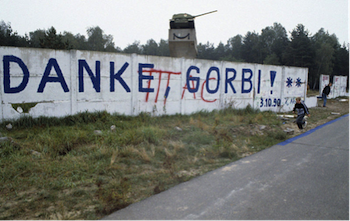

|
The Soviet Empire Collapses  The end of the Berlin Wall ('Thanks, Gorby!') Without the military support of Moscow, the Soviet satellites of Eastern Europe collapsed easily under pressure from below. In Poland mass strikes and protests forced the Communists into round-table talks with Solidarity, which won sweeping victories in semi-free elections in 1989. Communist authority was undermined. Wojciech Jaruzelski, who had led the military government from 1981, resigned as President and Tadeusz Mazowiecki, the Solidarity activist and soft-spoken Catholic intellectual, became Prime Minister, the first non-Communist to lead a government in Eastern Europe for forty years, in September 1989. In Hungary the ageing Kadar was removed from power in May 1988. The Communists began talks with opposition activists in the Democratic Forum, which emerged as the largest party in the 1990 elections. In the GDR problems began when the Hungarians opened the border to Austria and thousands of East Germans passed through to the West. Attempts to stem the exodus led to mass protests. Led to believe that the Berlin Wall was open, tens of thousands of East Germans arrived at the border from 9 November. Without clear instructions, the guards let them through. The Wall came down. Over 120,000 citizens left the GDR before the end of 1989. The fall of the Wall inspired student demonstrations in Czechoslovakia which quickly spread into a wider protest movement organized around a Civic Forum organized by Vaclav Havel and other dissidents. The Communist regime conceded free elections and resigned from power, allowing Havel to become President on 29 December by a unanimous vote of the Federal Assembly confirmed six months later by the people. |
© 2014 Orlando Figes | All Rights Reserved